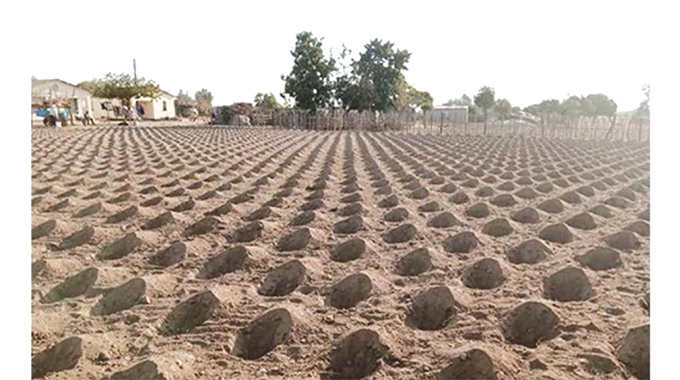Welcome back, bread basket

Stephen Mpofu
THE newly-introduced zero-tillage concept of farming which produced a bumper harvest in the 2020-2021 cropping season and is popularly known as Intwasa or Pfumvudza, will no doubt have gone down the minds and hearts of Zimbabweans as a God-send.
A nation that suddenly finds itself in dire circumstances, as we have, due to a combination of brutal, illegal Western sanctions and the Covid-19 coronavirus, is wont to regard the new agricultural method not as a mere windfall but, rather, as God’s handwork buttressing our country’s national development strategies towards a brave new future.
Under the above circumstances this particular discourse is intended to persuade our readers and all other Zimbabweans concerned to zero-in on the basics as a way of underpinning our Government’s developmental initiatives in order to make independence and self-determination in the wake of colonialism’s demise a reality with the begging bowl grounded for as long as Uhuru remains a valve embraced by all uninverted patriots.
At independence in 1980, and in spite of meagre resources, including infertile land in the hands of black majority, peasants demonstrated their unflinching determination for survival under oppression by turning the motherland into a regional bread basket to celebrate freedom with the breadline extending as far north as Egypt and with alongside it millions of surfeited bellies.
Now with the draconian Western economic embargo slowly on its way out, if recent loud rhetorics in the West about the need to invest in Zimbabwe’s God-endowed rich mineral resources and in tourism are anything to go by, all of us Zimbabweans must put our shoulder to the wheel to shame the proponents of regime change and Western imperialist stooges drawn by the ear to the citadels of power in our country.
Bumper harvests of maize and other food crops due to a combination of good zero-tillage methodology of food production will see the large sums of scarce forex now being used to import food being spent on major development programmes.
This therefore, impels Zimbabweans to make agriculture the country’s bedrock with young men now leaving the country in large numbers
to render virtual slave labour in neighbouring countries and elsewhere for lack of jobs stay put at home to live off agriculture in our motherland in order to earn money from exports to countries elsewhere that continue to hold begging bowls for food for various reasons including political conflicts and droughts.
Now also should be the time for women in general, and girls not in school in particular, to embrace agriculture as business which will certainly give them a brave new future individually and collectively as a nation and in that way chart a bright future for themselves and for the country as a whiole.
There are also important safeguards for agriculture that our nation should consider and one of them is environmental protection.
Right now massive hectares of forests are being wantonly denuded each year by people creating space for new homes as well as for agricultural purposes as the country’s population grows, while nothing is visibly being done to curb deforestation.
As most if not more Zimbabweans, should know by now, deforestation has dire consequences not only for a country but globally as well.
Trees draw, as it were, rainfall and so desertification will have obvious dire consequences for our agricultural industries as well as for the existence of people and their livestock when faced with little or no rainfall at all as a result of people’s cruel environmental violations.
Not only that. Trees are also known to absorb and sink toxic gases emitted into the upper atmosphere from veld fires as well as from unmodified factory chimneys.
The gases render ozone, the layer that protects earth from the dangerous rays of the sun and, today, humanity is gripped by global warming which causes recurrent droughts and hunger because dangerous gases are being pumped as fumes from factory chimneys in many countries and from veld fires and these combine to heat the earth’s atmosphere dangerously.
In Zimbabwe’s case, chiefs and their subordinate traditional leaders should be made by the Government to exercise tight control over areas under their jurisdiction in order to protect the environment for the ultimate benefit of our nation as a whole.
Appropriate sanctions may be imposed to stop tree vandals as well as those who deliberately or ignorantly pollute sources of water for domestic use or for livestock as well as illegal gold panners who dig up river beds in search of the yellow metal and cause siltation of dams or lakes that also supply water for command agriculture.
The Government must be applauded for introducing measures to improve sanitisation in rural communities under the Rural Transformation Programme by introducing flushable toilets.
Right now 70 percent of Zimbabweans live in rural areas with 60 percent of the people vulnerable to open defecation.
When rains come the human excreta is washed away and deposited into open wells or rivers where people draw water from for domestic use.
Some of the human waste may be contaminated with diseases which then infect consumers of the unclean water with dire health consequences for the people affected as some or most of them live far away from health centres making it difficult for those who become sick as a result of the contaminated water to be attended timeously.
It is common knowledge that people possessing a healthy mind in a healthy body will make progressive decisions in nation building and follow these up by actively participating in development for the benefit of their nation as a whole.











Comments